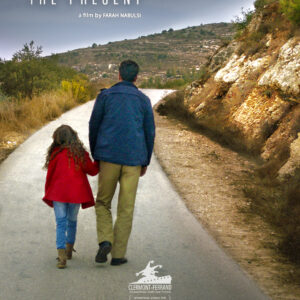Yousef Khalidi is a loving Palestinian father and husband living in Bethlehem. One day, he wakes up early to travel to the city of Beitunia with his daughter Yasmine to buy a fridge as an anniversary gift for his wife Noor. Even though the distance between these cities by road is only 14 miles, the checkpoints administered by the IDF and private security companies make the journey an all-day affair. As Yousef and Yasmine set out, the sharp contrast between the freedom of movement allowed to Israeli settlers and the ordeal Palestinians must face is made apparent. Various checkpoints, walls, road barriers, and trenches are in the way of the other Palestinian towns in the West Bank.
In 2023, according to the UN’s Office for the Coordination of Humanitarian Affairs (OCHA), there were 645 physical obstacles in the West Bank, fortified with metal detectors, surveillance cameras, and facial recognition technology, along with detention and interrogation facilities. Over half of these were investigated by the OCHA and were observed to have a “severe impact on Palestinians by preventing or restricting access and movement to main roads, urban centres, services, and agricultural areas.” Depictions of these checkpoints show how people are treated like cattle, corralled into confined areas lined with fences and being strictly interrogated by Israeli soldiers. Yousef is forced to give up his belongings before he and Yasmine are held in literal cages.
The film showcases the emotional tolls brought on by the humiliation and intimidation that is all too normal in the everyday lives of Palestinians struggling to get to even the next town over. Viewers experience this through the eyes of Yasmine, watching her childlike innocence disappear under the oppressive reality, while Yousef’s desensitization from a lifetime of dehumanization almost blinds him from his daughter’s emotional trauma. With close-ups focusing the lens on the eyes and weary faces of the characters, their inner turmoil is captured in the quiet moments as they process the embodiment of the apartheid system. Yousef deals with the racist taunts with humor and negotiation, but even he has a breaking point from the convoluted and discriminatory system, and Yasmine soon develops her own sense of self-determination and bravery in a world determined to hold her back.
Writer and director Farah Nabulsi was inspired to write this story based on her own experiences and firsthand accounts of Palestinians facing the long, arduous, and degrading process that was purposely designed to humiliate them. She wanted to capture the everyday reality of the checkpoints’ impact on the human spirit and how their effects permeate from the individual to entire communities. She states that the film, at its core, is a statement on the basic human right to freedom of movement; until the COVID-19 pandemic, that right was something most people took for granted. This film shows how the inability to travel is connected to other fundamental rights preventing people from earning a living, receiving medical care, going to university, or something as mundane as buying a gift for those they love.
The film was widely praised, earning 34 wins and 22 nominations across festivals and awards, including Best British Short Film at the 2021 BAFTA Film Awards and an Oscar nomination for Best Live Action Short Film. The film was initially released on Netflix but is now available on Amazon Prime Video, Tubi TV, and Apple TV.


